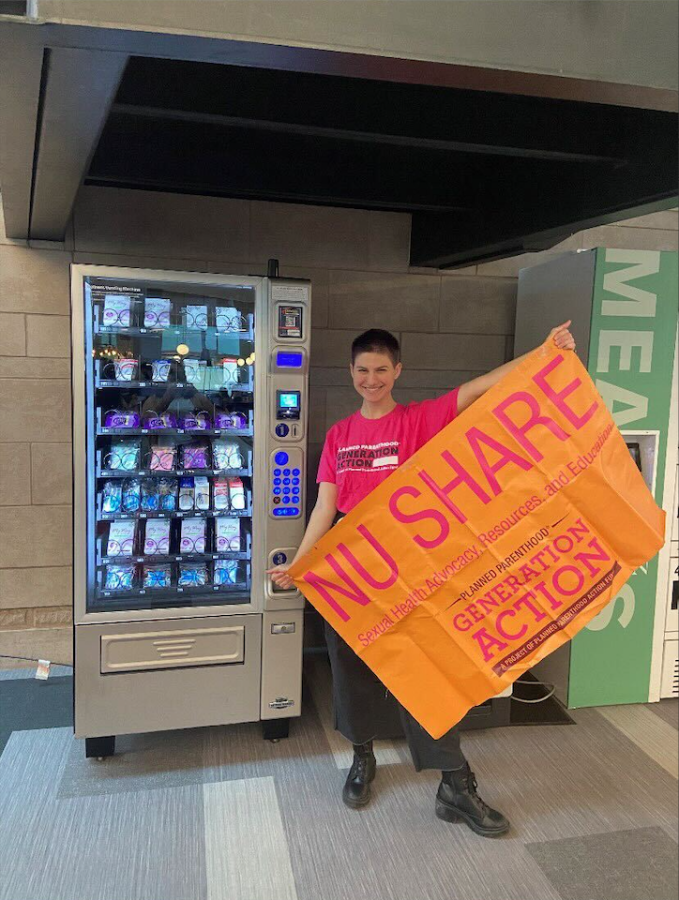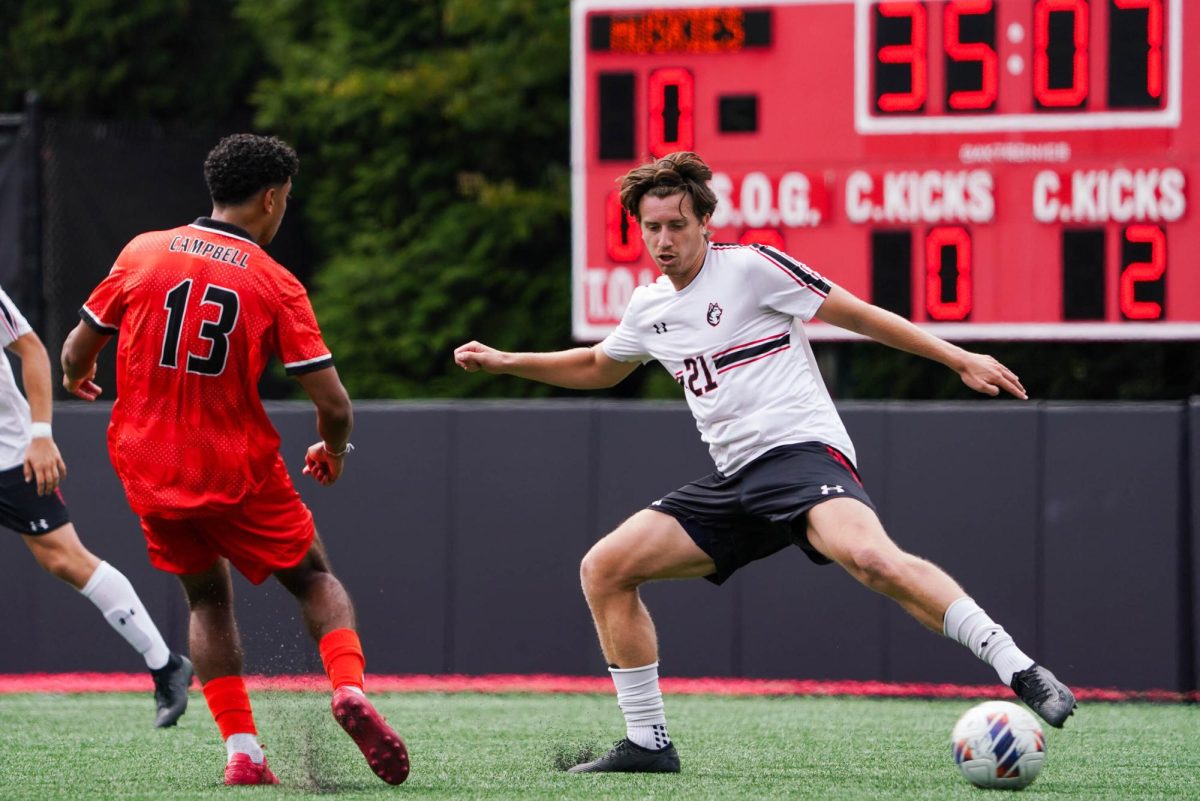NU SHARE installs emergency contraception vending machine, rallies for reproductive health access
NU SHARE has collaborated with the Office of Prevention and Education at Northeastern and University Health and Counseling Services to open an emergency contraception vending machine in the Marino Center Atrium, which was unveiled Oct. 25. The vending machine offers discounted Plan B pills and headache medicine, and free sexual and menstrual health products. Photo courtesy of Elizabeth Costa.
October 27, 2022
There’s a new vending machine on campus, but you can’t purchase a soda or candy bar from it.
On Oct. 25, NU Sexual Health Advocacy, Resources and Education, or NU SHARE, in collaboration with the Office of Prevention and Education at Northeastern and the University Health and Counseling Services, unveiled the wellness vending machine in the Marino Center Atrium. The vending machine contains emergency contraception, sexual health supplies, menstrual products and other wellness supplies.
The campaign to install the vending machine has been in the works since last semester, said Alexandra Nieto, a fourth-year biology major and the vice president of SHARE.
“It was a long process of trying to find the correct machine and trying to find certain manufacturers that were able to stock the machines,” she said. “The emergency contraceptive pills were really hard to come by due to both interest and supply chain issues, so there was a delay in getting the machine going on campus.”
Support of the vending machine was garnered through petitions and protests. Members of the Northeastern University Roe Coalition held a protest in early May demanding both the installation of an emergency contraception vending machine and a statement from the university in support of these endeavors.
“It’s been a very scary and frightening political climate and we were really looking for them to be there in support,” Nieto said.
The vending machine is open for use by any student, faculty or community member. It contains a generic Plan B pill for $7; Tylenol, Advil and Tums for $2; free condoms, dental dams and lubricant and free menstrual products.
The addition of the vending machine to the campus health sphere is an important one, as having the Plan B pill “physically close and financially accessible” will help many students and community members obtain it safely and on a budget, Nieto said.
Accessibility of emergency contraception is just one of the topics that SHARE, a club devoted to sexual and reproductive education, delves into with students seeking knowledge and answers.
True to its name, Northeastern students are encouraged to share their experiences in a safe space while also becoming more educated on topics pertaining to reproductive health and justice.
Nieto said she was drawn to the organization by the club’s message of openness and ability to be a “safe space for sensitive topics” — as well as the club’s suggestive selling points.
“Honestly, what brought me in is that they were tabling and had stickers that looked like mushrooms and also a penis,” she said with a laugh.
The stickers may be a catalyst for funny conversations with students, but for the organization, they represent a sign of acceptance and an embracing environment.
“I really joined because of how open they were talking about sex and how welcoming the space was,” Nieto said.
Finn Seifert, a third-year human services major and the treasurer of SHARE, said he was inspired to become a member of the organization after hearing that the club is aligned with Planned Parenthood.
“I was looking for a space that was sex-positive and also focused on advocacy work,” he said. “We’re a Planned Parenthood Generation Action group, and I found that really interesting because I’m passionate about the work that they do.”
Generation Action is a nexus of young activists who are fighting for reproductive freedom, raising awareness about reproductive rights and educating people about sexual health. All of the work that SHARE does “aligns with the services and political statements of Planned Parenthood,” Nieto said.
At its Oct. 17 meeting, SHARE collaborated with the Northeastern Interdisciplinary Women’s Collaborative, or IWC, for a letter-writing campaign in support of reproductive justice. Members of both organizations wrote to their elected state representatives to pass the Right to Contraception Act, or H.R. 8373.
“We’re writing about passions we care about … that can be anything from abortion access, to accessible [sexually transmitted infections] testing, to access to contraceptives such as birth control pills and condoms,” Nieto said.
These organizations are doing a lot of work in order to protect the right to contraceptive access because of “recent legislative attacks” on these rights, Seifert said.
At the forefront of these attacks is the recent overruling of Roe v. Wade, but SHARE has been working to ensure that Northeastern students have the resources they need and deserve despite this ruling. This goal includes the recent opening of the emergency contraception vending machine in Marino.
The letter-writing campaign was just one of many events held by SHARE that served to educate Northeastern students on matters of reproductive and sexual health. Nan Venderbush, a second-year psychology major and the membership coordinator of SHARE, said she is ardent about ensuring students have a proper and all-inclusive education about these matters.
“We have a ‘Not Your High School Sex Ed’ meeting … where we ask our members to tell us about their high school sexual education experiences,” she said. “It is absolutely shocking to hear how little information people have regarding sex and reproduction prior to coming to college. Here, we emphasize that if you’re having sex, you should be able to talk about it.”
One of SHARE’s most highly-attended events is its annual Pleasure Party. For one night, a corner of the Curry Student Center becomes a hub for “all things pleasure,” such as trivia, raffles and free safe sex supplies.
“We’re celebrating self-love and the pleasure aspect of sex,” Nieto said. “All the time, people talk about the scary aspects, like STIs and reversal of pregnancies, but our Pleasure Party is to celebrate all the good things we like about sex.”
On Sept. 8, over 200 students attended the Pleasure Party, engaging in a celebration of themselves and the importance of sexual health and pleasure in a fun, welcoming atmosphere. At the event, SHARE raised $155 for ARC Southeast, an organization that provides support and funding for reproductive services in the South.
“This is such an amazing community of people with such passion for reproductive justice and for having an equal and comprehensive sex education,” Venderbush said.







